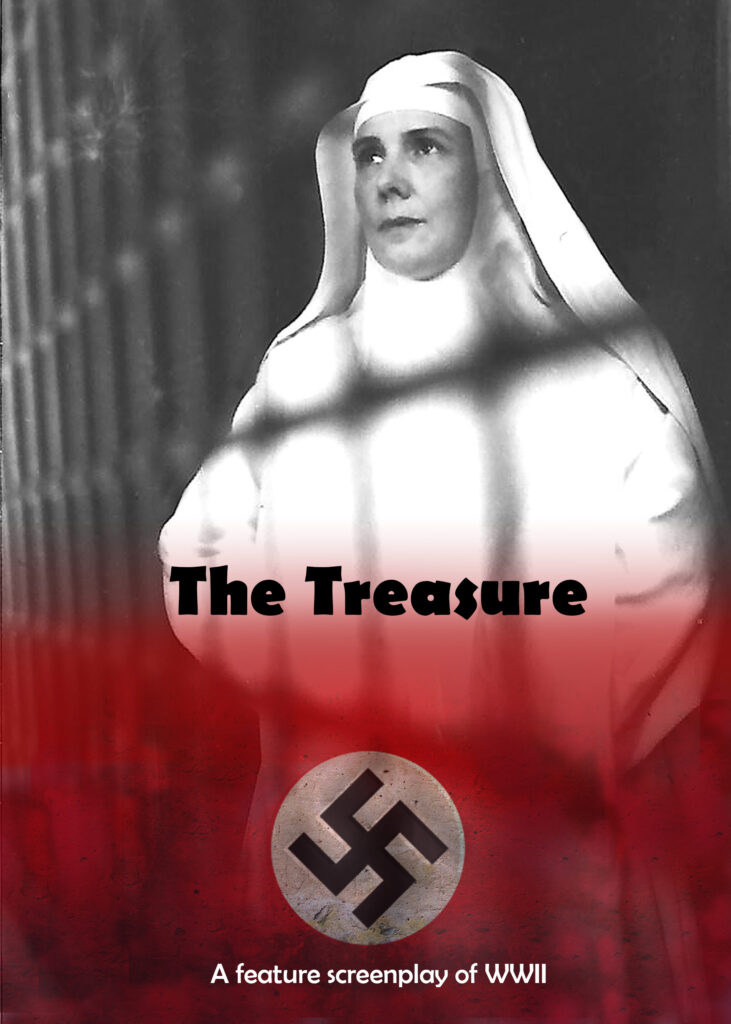
The Nazis are invading France. In the middle of the night the priest at an obscure seminary in the Pyrenees gets a call from an old school friend, an official in the government of King Leopold – can the priest help hide the Belgian National Treasure?
Crossing the castle grounds to the convent that dominates his seminary, he rouses the Mother Superior and begs her help. After praying, she returns to the barred visitors’ room and “Yes. You can put it through the turnstile.” “Mother,” he admits, “it’s in four trucks.”
The radio, taken over by the Germans, advises town by town the hour the next morning when the German army will arrive. Resistance will be futile. At midnight the Belgian trucks roar through the tense town of Poyanne and heavy case after case, blazoned with the arms of King Leopold of Belgium, are loaded into the convent’s room for bee keeping supplies. In the morning the Nazis arrive. Their orders are to turn the convent into a Rest and Rehabilitation Center for the army – and to find the Belgian National Treasure.
“We have very old and fragile German princesses here,” the Mother Superior tells the commanding officer. “Your Fuehrer would not want them to be disturbed.” With this ruse the soldiers are kept out of the convent itself as the seminary and garden are taken over. For four years the Nazis remain. The nuns starve, shelter Resistance fighters and downed British pilots, and keep secret the flow of refugees who stream through nearby mountain pass on their way to freedom in Portugal.
This true story is told through the adventure of Denise, a teenager who planed to be a nightclub chanteuse or a dancer – or a nun. When refugees flood through her seaside resort town, followed by the invading Germans, she’s horrified by the cruelty and suffering she sees. In the night, with the help of her local priest, she flees to the convent in Poyanne, coming the very evening before the Treasure arrives. Earlier that day the convent’s wealthy, middle aged patroness, Gertrude, has come, announcing she has given all her wealth to a missionary in China so she can join the sisters in their holy poverty. The nuns now face starvation. They do all they can to force Denise to go back home but, sending her out in a muddy field in her cut down high heels, and giving her only a teacup of water to “bathe in” only makes the exuberant girl the more determined to stay. Twinned with the elderly Gertrude in their shared novitiate, Denise, on her way to becoming Sister Placide, threads a comic and heroic theme against the tragedy and violence of the war.
This story is written from interviews with the elderly Sr. Placide at her convent in Windsor, New York. Unhappy at Poyanne, high spirited Sr. Placide wanted to become a hermit in Tahiti but her bishop had no intention of letting her loose in the world. When an American nun, Sr. Jean Marie, visited Poyanne, Placide enrolled her in her effort to make a new life elsewhere. With Jean Marie’s promise to be responsible for her, the two left for Canada, giving time for Placide to learn English. With Jean Marie’s inheritance they purchased land In Upstate New York and built their convent, Transfiguration Monastery.
Many thanks to Sr. Donald Corcoran and Sr. Sheilah.